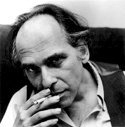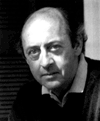
What You Missed
Danger In Pictures
Spiegelman and Mouly Speak at the Chicago Humanities Festival
By Trev Kelderman
"The media is lying to you, and we're part of the media," said the chain-smoking Art Spiegelman from behind the podium, while stating one of the original concepts behind MAD magazine. Still suffering from nervous excitement, I sat in the audience hanging on his every word. Excited to see the creative (and married) team of Françoise Mouly and Art Spiegelman give lectures for the Chicago Humanities Festival, I went into the weekend of November 10 and 11 with a lot of anticipation. Luckily, I was not disappointed.
 Françoise Mouly |
Françoise Mouly spoke on the morning of November 10 to a nearfull auditorium at the Chicago Historical Society. The art editor for The New Yorker talked about her history and interest in publishing. She and Spiegelman started RAW magazine, an outlet for underground comic book artists. With subtitles such as "Graphix Magazine that Lost its Faith in Nihilism" and "Abstract Depressionism," this independently published magazine challenged the established norms of not only the comic book industry, but also the media in general. Françoise attempted to show the editor's hands at work by doing physical things with the book. For example, in issue number five the dirty pictures were censored out. When the readers sent in a photocopy of their IDs the genitals were sent to them as stickers so they could affix them to the magazine. In 1993 Françoise Mouly became art editor for The New Yorker making her responsible for the covers and any freestanding artwork. She was faced with the task of continuing The New Yorker tradition of having the covers be a player in the cultural dialogue, and possibly even increasing their cultural statements. "A magazine very much projects itself and reflects itself in its cover," said Mouly, making the claim that you can judge a book by its cover. After being involved with many a discussion on the covers for F News, this remark rang more true for me than it might for some.
 Art Spiegelman |
From the covers of The New Yorker to the award-winning pages of Maus I, Art Spiegelman is revered for his writing and his art. He took the stage on November 11 at the Northwestern University School of Law auditorium, quite noticeably a shaken man. Proceeding to tell his story around the events of September 11, he renamed his "Comics 101" lecture "9/11 101." Like many artists, this Pulitzer Prize-winning author was in search for a justifiable reason to continue making art. For him, the basic structure of comics provided some clarity. Comics structure experience through the physical division of space while giving form and organization to the emotions and thoughts expressed within them. This visual choreography proved itself to be important to him. Spiegelman stated, "Comics are a way of portraying past, present, and future all at the same time." He showed slides of work by comic book artists such as Robert Crumb, Will Eisner, Jules Feiffer, Lyonel Feininger, Harvey Kurtsman and Chris Ware, among others. In the wake of September 11, Spiegelman found particular solace in the open-ended metaphors of George Herriman's "Krazy Kat." Near the end of his lecture he said some very profound things in regards to the current state of society. "It isn't the death of irony. It's the death of air quotes ... [We're] searching for a new kind of sincerity. Neo-sincerity," Spiegelman said.
Leaving Thorne Auditorium with freshly signed books by Fran�oise Mouly and Art Spiegelman, I was still reeling from the weekend and all of the creative insight I had to digest. It was inspiring and strangely calming to know that even a Pulitzer Prize winner is asking some of the same truth-seeking questions that the rest of the art community is asking. The truth is that there is no truth, but at least he had some answers.
Poet Populist
U.S. Poet Laureate Billy Collins Packs Poetry Center Event
By Heidi Broadhead
Billy Collins Reading Sold Out - this sign disappointed all those who showed up at the Chicago Historical Society without a ticket or a reservation for the anticipated appearance of the nation's Poet Laureate.
 Billy Collins |
Collins, appointed to the post of U.S. Poet Laureate for 2001-2002 on October 1, read from his most recent book Sailing Alone Around the Room: New and Selected Poems, followed by an interview with National Public Radio's "This American Life" host Ira Glass. This event, the first officially "sold out" event for the Poetry Center of Chicago during the last two years, drew national media attention. In fact, the November 19 issue of The New York Times featured the Poetry Center in its "Living Arts" section with a discussion about Collins' growing fame and popularity.
Collins is the author of six collections of poetry, including Picnic Lightning, The Art of Drowning, and Questions About Angels. During the interview he discussed his adoration of, aspiration to and reconciliation with poetry. He began writing poetry in the early 1970s and focused for many years on trying to be a "new Wallace Stevens," but eventually realized that poetry didn't have to be difficult to be good. He changed his writing style to something certainly more accessible and possibly unexpected in the world of serious poetry - he added humor.
Audience members found themselves at something more akin to a standup comedy show than a poetry reading. Anyone who attends poetry readings on a semi-regular basis knows that applause is generally reserved until the end of the presentation and the poet is left to wait for an occasional "hmmm" or "oh my" for a response. Not Collins. From the beginning, he had the audience guffawing and struggling to breathe with lines like:
I have never heard anyone sing
I am so beautiful
and you are a fool to be in love
with me.
-from "Nightclub"
"I thought that poets were gods; now I realize they are gods."
"... an open mic reading from the middle-ages: Hi, my name is Dante, and I'm just gonna read three poems."
Collins admits to poking fun at certain poetic conventions that are overused. "Like many poets, I'm taking conventions that seem to be played out and am having fun with them," Collins said.
By taking poetic conventions and playing with them he showed the audience how much fun poetry can be, while sneaking in a lecture about its conventions. He read one of the new poems from Sailing, called "Sonnet," which contains instructions for constructing a sonnet:
All we need is fourteen lines, well,
thirteen now,
and after this one just a dozen
In between the jokes, and within his poems, as with "Sonnet," Collins teaches the audience about poetry. For example, when making a point about the every day appearance of Haiku, Collins pointed out how many things in our lives have a similar 17 syllable-structure - the nursery rhyme "Mother Hubbard," the opening lines of the song "Let it Be," and an example of two university students he overheard talking in the hall:
When he found out he
was like oh my god and I
was like oh my god
It's no surprise that Collins takes on the educational role naturally. He has been teaching poetry, as he said, for "years and years" and is currently a Distinguished Professor of English at Lehman College of CUNY and a visiting writer at Sarah Lawrence.
The United States Poet Laureate is chosen by the Librarian of Congress and includes a $35,000 stipend. Robert Pinsky held the post for the last three years, raising awareness of poetry with programs like the "Favorite Poem Project." How will the next Poet Laureate fill this public post made so visible by Pinsky?
Collins indicated to Glass that he has been receiving a lot of requests for his opinion. "I'm uncomfortable to some degree trying to speak collectively," Collins said. "Poetry is personal communication. ... My position seems to be no position."
He also stressed that he is not interested in a blanket promotion of all poetry. "It's difficult to pick up the poetry banner and wave it indiscriminately," Collins said. It was not clear what poetry would be excluded from his accolades. However, he did explain what he expects from his own poetry and perhaps, from poetry in general: that it be an "exercise in imaginative freedom" rather than something approached in an overly-critical or punitive manner, seen only in classrooms.
Collins is planning his first official program, "Poetry 180," which would bring a poem a day into public school classrooms to be read over the intercom with the morning announcements. "Teachers will be instructed not to discuss the poetry," Collins explained, "the idea being that poetry becomes part of the everyday routine, not something that is taken apart and criticized."
Humorist, educator, populist. These labels seem inadequate to describe our new national poet/teacher, who describes poetry as a sculpture that occupies the page in a shape, an "interruption in the silence" one minute, then admits moments later, "All I do is watch TV, honestly."
|

